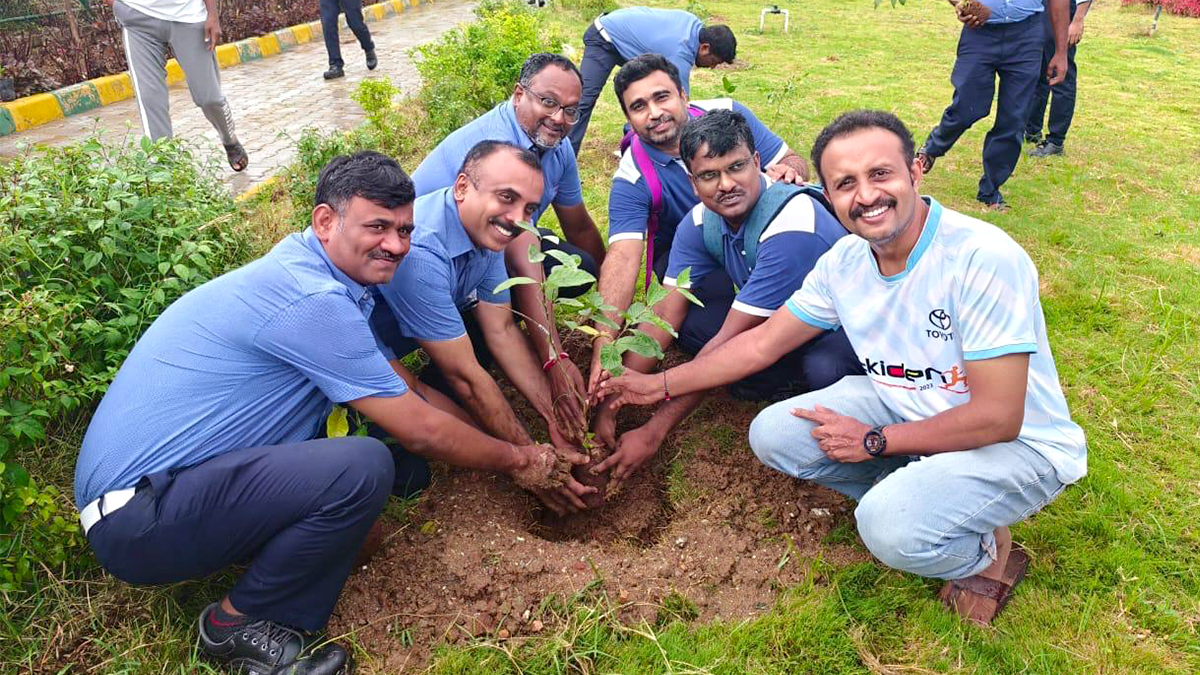Marking the World Environment Health Day, Toyota Kirloskar Motor (TKM) reaffirmed its long-standing commitment to environmental sustainability.
Over the years, TKM has consciously adopted sustainable business practices and transformed from a carmaker to a mobility company. Keeping with its principle of ‘Respect for the Planet’, Toyota globally announced the ‘Toyota Environmental Challenge 2050’ (TEC 2050) in October 2015, comprising six environmental challenges.
The first set of 3 challenges focuses on achieving carbon neutrality from our products, and its entire value chain including the manufacturing activities. The latter 3 challenges aim to create a net positive impact.
Aligning with the TEC 2050, TKM’s multi-faceted strategy continues to deliver innovative solutions that go beyond product and service offerings, with significant achievements in the areas of nature conservation (e.g. afforestation, cultivating native biodiversity, etc.), resource efficiency (water, materials and energy management), and advancing recycling & reuse initiatives and more.
Further, the company’s eco-conscious efforts not only focus on positively contributing to the environment but also promoting sustainable living among various stakeholders (employees, community, suppliers, dealers, school children, etc) to enable a recycled-based society, and establish a future society in ‘Harmony with Nature’.
Under its product portfolio, TKM continues to provide practical mobility choices towards achieving carbon-neutral goals, by adopting a multi-pathway approach (xEVs – hybrid electric, plug-in hybrid electric, fuel cell electric vehicle, battery electric vehicle, etc.) based on the country’s current energy mix, infrastructure readiness and unique consumer’s needs.
The company has also actively pursued innovative advanced vehicle technologies driven by bioenergy (e.g. Ethanol) that can rapidly displace fossil fuel consumption at large scale as well as achieve low carbon emissions on a comprehensive Well-to-Wheel (W2W) basis. Leveraging on the distinctive opportunity, in August 2023, TKM unveiled the Prototype of the World’s First BS6 Stage 2 Electrified Flex Fuel Vehicle.
Furthermore, the company has implemented various sustainable practices in its manufacturing, moving closer to its set goal of achieving ‘Net Zero Carbon in Manufacturing Operations’ by 2035, and it continues to share such best practices across its value chain. To highlight some of the key eco achievements by TKM, so far:
Sharing his thoughts, Padmanabha – Executive Vice President and Director of manufacturing, Toyota Kirloskar Motor said, “Our vision is to continuously evolve into a true mobility company, exploring every avenue to achieve “Carbon Neutrality.”
Aligned with Toyota Environmental Challenge 2050, we have embedded rigorous mitigation plans and key metrics into our sustainability goals, enhancing both the transparency and resilience of our climate strategies.
Our commitment to carbon neutrality is reflected in the diverse eco-sustainable practices we implement—ranging from resource optimization to circular economy initiatives and nature preservation—across all operations and the value chain.
These efforts demonstrate our dedication, with tangible impacts backed by well-defined performance metrics. Additionally, we actively engage our value chain partners and stakeholders, encouraging them to adopt measures that promote sustainable living.”




